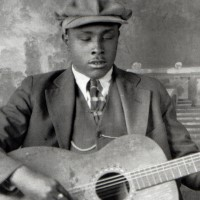Home » Jazz Musicians » Blind Willie McTell
Blind Willie McTell
Blind Willie McTell was one of the great blues musicians of the 1920s and 1930s. Displaying an extraordinary range on the twelve-string guitar, this Atlanta-based musician recorded more than 120 titles during fourteen recording sessions. His voice was soft and expressive, and his musical tastes were influenced by southern blues, ragtime, gospel, hillbilly, and popular music. At a time when most blues musicians were poorly educated and rarely traveled, McTell was an exception. He could read and write music in Braille. He traveled often from Atlanta to New York City, frequently alone. As a person faced with a physical disability and social inequities, he expressed in his music a strong confidence in dealing with the everyday world. McTell was born in Thomson, Georgia on May 5, 1898. Few facts are known about his early life. Even his name is uncertain: his family name was either McTear or McTier, and his first name may have been Willie, Samuel, or Eddie. His tombstone reads "Eddie McTier." He was blind either from birth or from early childhood, and he attended schools for the blind in Georgia, New York, and Michigan. McTell learned to play the guitar in his teens from his mother, relatives, and neighbors in Statesboro, where his family had moved. In his teenage years, after his mother's death, he left home and toured in carnivals and medicine shows. In the 1920s and 1930s, McTell traveled a circuit between Atlanta, Augusta, Savannah, and Macon. This region encompasses two major blues styles: Eastern Seaboard/Piedmont, with lighter, bouncier rhythms and a ragtime influence; and Deep South, with its greater emphasis on intense rhythms and short, repeated music phrases. McTell also journeyed from Georgia to New York City. Along the way he entertained wherever he could find an audience: passenger train cars, hotel lobbies, college fraternity parties, school assemblies, proms, vaudeville theaters, and churches. As he followed the tobacco market from Georgia into North Carolina, he played for farmers, buyers, and merchants at warehouses, auctions, livery stables, and hotels. By the mid-1920s McTell was already an accomplished musician in Atlanta, playing at house parties and fish fries. He had also traded in the standard six-string acoustic guitar for a twelve-string guitar, which was popular among Atlanta musicians because of the extra volume it provided for playing on city streets. By 1926 record companies had begun to take an interest in recording folk blues artists, mostly men playing solo with guitars"Blind Lemon Jefferson from Texas, Charley Patton and Tommy Johnson from Mississippi, Peg Leg Howell and Blind Willie McTell from Georgia.
Read moreTags
Lucky Peterson Interprets Tom Waits, Lucinda Williams, Ray Lamontagne, Robert Johnson & Blind Willie McTell

Source:
conqueroo
Blues singer/keyboardist/guitarist's first album in seven years features Larry Campbell, Scott Petito and Gary Burke, and songs by Robert Johnson, Blind Willie McTell, Tom Waits, Ray LaMontagne and Lucinda Williams
WOODSTOCK, N.Y.--Lucky Peterson was discovered by blues legend Willie Dixon when he was three years old, released his first record at five and soon after appeared on The Tonight Show. Trained by keyboardists Bill Doggett and Jimmy Smith, Peterson went on to play behind Little Milton, Bobby “Blue" Bland and ...
read more
























